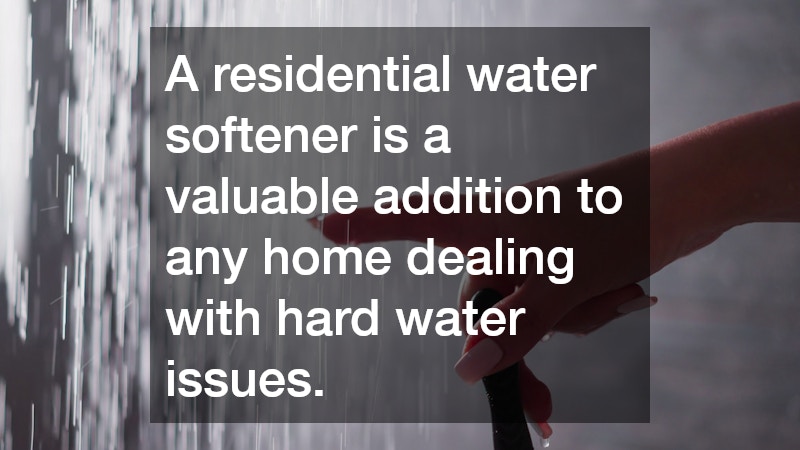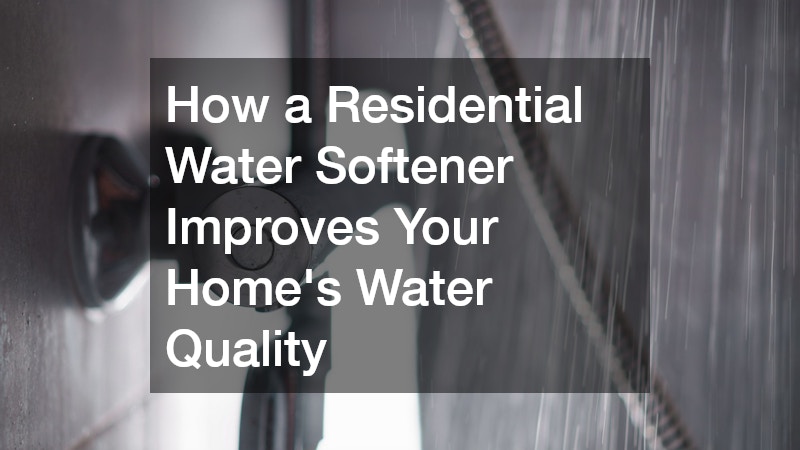Water is essential for everyday life, but not all water is created equal. Many homes receive hard water, which contains high levels of minerals like calcium and magnesium. While hard water is generally safe to drink, it can cause a range of issues that affect your home’s plumbing, appliances, and even your skin and hair. Installing a residential water softener is an effective solution to these problems, improving the quality of your home’s water and enhancing your overall living experience.
Understanding Hard Water and Its Effects
Hard water occurs when groundwater absorbs minerals as it passes through soil and rock. While these minerals are natural, their presence can cause significant problems in a household setting.
Hard water leads to mineral buildup, often seen as scale deposits inside pipes, faucets, and appliances like water heaters and dishwashers. This buildup reduces water flow, decreases the efficiency of appliances, and shortens their lifespan. Hard water also interferes with soap and detergent, making it harder to clean clothes, dishes, and even your skin properly. Over time, you might notice spots on glassware, stiff laundry, and dry skin or hair — all signs that your water quality needs improvement.
What Is a Water Softener?
A water softener is a device designed to reduce the mineral content in hard water. It typically works through a process called ion exchange, where the calcium and magnesium ions are replaced with sodium or potassium ions. This exchange eliminates the minerals responsible for hardness, resulting in “softened” water. Water softeners come in various sizes and styles, tailored to fit different household needs. Some models are compact enough for small homes, while others are designed for larger households or those with particularly hard water. The system usually involves a tank filled with resin beads that facilitate the ion exchange and a brine tank used to regenerate the system periodically.
Enhancing Plumbing and Appliance Longevity
One of the most significant benefits of installing a water softener is the protection it offers to your home’s plumbing system and appliances. Hard water causes scale buildup inside pipes, restricting water flow and eventually leading to costly repairs or replacements. Softened water prevents this accumulation, keeping your pipes clear and reducing the risk of clogs or leaks. Appliances like dishwashers, washing machines, and water heaters operate more efficiently without scale deposits, consuming less energy and lasting longer. This can lead to substantial savings on utility bills and repair costs over time.
Improving Cleaning and Laundry Results
Hard water interferes with soap’s ability to lather and clean effectively. As a result, when washing dishes or laundry, you may find residues left behind, dull colors, or stiff fabrics. With a residential water softener in place, soaps and detergents work better, producing richer lather and improving overall cleaning power. Your laundry will come out softer and cleaner, with colors that stay vibrant longer. Dishes will be free of spots and film, reducing the need for re-washing. Softened water also means you’ll use less soap, which not only saves money but is better for the environment.
Enhancing Skin and Hair Health
Many people living with hard water experience dry, itchy skin and dull hair. The minerals in hard water can leave a residue on your skin and hair, stripping away natural oils and causing irritation. A water softener addresses these issues by providing water that rinses cleaner and feels gentler. Softened water helps maintain your skin’s moisture balance, making it softer and less prone to irritation. Hair washed with soft water tends to be shinier, smoother, and easier to manage. For those with sensitive skin or conditions like eczema, softened water can make a noticeable difference in comfort and appearance.
Environmental and Cost Benefits
While installing a water softener involves an upfront investment, the long-term benefits often outweigh the initial cost. Softened water improves the efficiency of your appliances, lowering energy consumption and utility bills. It also reduces the frequency of repairs and replacements, saving you money on maintenance. Additionally, softened water reduces the amount of soap and detergent needed for cleaning, which can decrease the release of chemicals into the environment. By using less product, you’re contributing to a more sustainable household.
Maintenance and Longevity of Your Water Softener
Maintaining a water softener is relatively straightforward. Most systems require periodic refilling of the salt or potassium pellets in the brine tank, which helps regenerate the resin beads responsible for softening the water. Regular maintenance ensures the system continues working efficiently and extends its lifespan. Many modern water softeners come with smart features such as automated regeneration cycles and alerts for salt levels, simplifying upkeep. By following the manufacturer’s maintenance guidelines, you can enjoy consistent water quality and avoid unexpected breakdowns.
A residential water softener is a valuable addition to any home dealing with hard water issues. It improves water quality by removing minerals that cause scale buildup, protects plumbing and appliances, enhances cleaning results, and benefits skin and hair health. Beyond these immediate advantages, a water softener can lead to cost savings and environmental benefits over time. Investing in a residential water softener means investing in your home’s longevity, your family’s comfort, and a more efficient, enjoyable living environment. If you want better water quality and the peace of mind that comes with it, installing a water softener is a smart choice.




